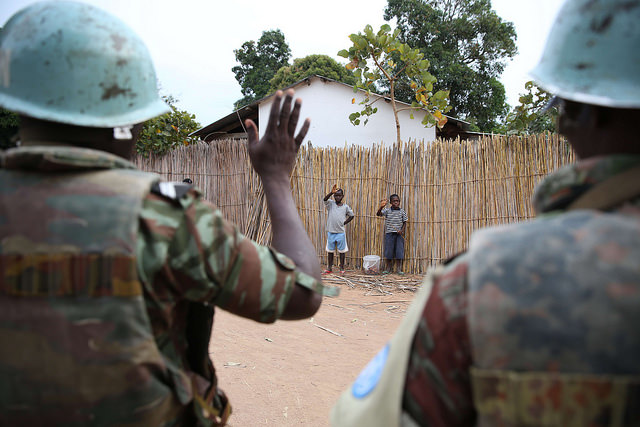
The recent
loss of two UN sanctions experts in the Democratic Republic of Congo has highlighted the riskiness and conditions of the experts’ jobs. UN experts work in some of the most volatile environments imaginable to support the organisation’s efforts to bring peace to troubled countries and associated regions. Yet little’s known about their work outside of the UN Security Council, and even less is known about the safety precautions they must take.
UN Secretary-General Antonio Gutteres
announced on 28 March that the bodies of Zaida Catalán and Michael Sharp had been located near Bunkonde in Kasia Central province in the DRC. The pair were members of the UN’s Group of Experts supporting the Security Council’s Sanctions Committee on the DRC. They were investigating large-scale violence and alleged human rights violations in the deeply unstable region by the Congolese army and local militia groups at the time of their disappearance. The UN also
announced that its investigators had discovered 17 new mass graves in the Kasai region, after the Congolese military killed at least 114 people, including 41 children, during its campaign to combat an insurgency by the Kamuina Nsapu militia.
Little is known at present about the circumstances of the experts’ deaths. Most recently, the DRC Government attempted to rebut suggestions of its involvement by releasing a
video of the murders to assert that anti-Government militia committed the acts. The experts’ disappearance marked the first time that UN experts had been reported missing in the DRC and was the first recorded disappearance of international workers in the Kasai provinces. The experts reportedly traveled through the bush on motorcycles, accompanied by four Congolese, as traveling in UN vehicles might have made them a target. The DRC government has criticised the UN for failing to protect the experts, stating that
‘if the Government had been informed of the activities of these officials, perhaps they would have had an escort for their safety’. However, given the experts’ investigations extended to the conduct of the Congolese army, notifying the government of their movements was never a realistic option.
Gutteres has
confirmed that the UN will conduct an investigation into the deaths of Catalán and Sharp and encouraged the Congolese authority to also fully investigate the incident. Similarly, the Security Council has issued a
press statement which condemned the murders and called on the DRC government to swiftly and fully investigate the crimes and bring the unidentified perpetrators to justice.
According to Human Rights Watch, the Uruguayan peacekeepers and Tanzanian Special Forces, who deployed to locate the experts, found the DRC government uncooperative—which indicates that the UN may hit some roadblocks during the investigation.
The UN’s public statements to date have focused on its intention to identify the perpetrators of the murders. However, the investigation must also involve an examination of effective safety precautions for experts. This should include revisiting protocols to determine where the experts can reasonably safely travel, ensuring that reliable security intelligence is available to the experts to inform their investigative approach, and assessing the preferred composition of security that should accompany experts in the field. A full contingent of UN security personnel would have hampered the experts’ fieldwork as, in many respects, they needed to be agile in their work and not overwhelm locals that are key to their investigative work. However, a balance must be found to ensure that experts aren’t unacceptably vulnerable when carrying out their work. It won’t be an easy fix, but it’s necessary.
France, as the Security Council ‘penholder’ on the DRC, will lead the Council’s political input to the UN Secretariat’s investigation. The US will also be active, particularly as Sharp was a US citizen. They will need to pressure the DRC to be constructive in the investigation.
While Australia, a non-Council member, won’t be expected to play a role in the investigation, our track record as a strong advocate for UN sanctions during our recent Security Council term gives us authority to contribute to reform efforts. We should add to the process by connecting with Council members and the UN Secretariat to add weight to their investigation. It’s notable that the
findings of the High Level Review of UN Sanctions, which Australia led in 2015, acknowledged that experts had raised concerns about the physical threats they faced. Those threats ‘could extend beyond dangers inherent in field work in conflict zones to include direct personal threat from individuals or entities being investigated’ and contended that effective UN duty of care policies should be in place. While the experts didn’t identify what they considered were the particular failed UN policies, the UN’s Department of Safety and Security and Security Council Affairs Division could address concerns by tightening its protocols on threat assessments and security attachments prior to further approvals for field work.
The deaths of the experts are a sad and timely reminder of the risks faced and the need for experts’ protections to be strengthened. Vital to that goal is that the UN act forcefully to ensure that there’s no impunity for these murders—not only because that is right, but also because it’s necessary to ensure that experts’ important work supporting UN sanctions continues.
[5] ‘if the Government had been informed of the activities of these officials, perhaps they would have had an escort for their safety’.: https://www.nytimes.com/2017/03/15/world/africa/congo-kidnapping-un-american-official.html?_r=0
 Print This Post
Print This Post